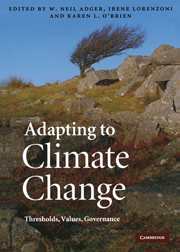Book contents
- Frontmatter
- Contents
- List of contributors
- Preface
- 1 Adaptation now
- Part I Adapting to thresholds in physical and ecological systems
- Part II The role of values and culture in adaptation
- Part III Governance, knowledge and technologies for adaptation
- 20 Whether our levers are long enough and the fulcrum strong? Exploring the soft underbelly of adaptation decisions and actions
- 21 Decentralized planning and climate adaptation: toward transparent governance
- 22 Climate adaptation, local institutions and rural livelihoods
- 23 Adaptive governance for a changing coastline: science, policy and publics in search of a sustainable future
- 24 Climate change, international cooperation and adaptation in transboundary water management
- 25 Decentralization: a window of opportunity for successful adaptation to climate change?
- 26 Adapting to climate change in Sámi reindeer herding: the nation-state as problem and solution
- 27 Limits to adaptation: analysing institutional constraints
- 28 Accessing diversification, networks and traditional resource management as adaptations to climate extremes
- 29 Governance limits to effective global financial support for adaptation
- 30 Organizational learning and governance in adaptation in urban development
- 31 Conclusions: Transforming the world
- Index
- References
27 - Limits to adaptation: analysing institutional constraints
Published online by Cambridge University Press: 31 August 2009
- Frontmatter
- Contents
- List of contributors
- Preface
- 1 Adaptation now
- Part I Adapting to thresholds in physical and ecological systems
- Part II The role of values and culture in adaptation
- Part III Governance, knowledge and technologies for adaptation
- 20 Whether our levers are long enough and the fulcrum strong? Exploring the soft underbelly of adaptation decisions and actions
- 21 Decentralized planning and climate adaptation: toward transparent governance
- 22 Climate adaptation, local institutions and rural livelihoods
- 23 Adaptive governance for a changing coastline: science, policy and publics in search of a sustainable future
- 24 Climate change, international cooperation and adaptation in transboundary water management
- 25 Decentralization: a window of opportunity for successful adaptation to climate change?
- 26 Adapting to climate change in Sámi reindeer herding: the nation-state as problem and solution
- 27 Limits to adaptation: analysing institutional constraints
- 28 Accessing diversification, networks and traditional resource management as adaptations to climate extremes
- 29 Governance limits to effective global financial support for adaptation
- 30 Organizational learning and governance in adaptation in urban development
- 31 Conclusions: Transforming the world
- Index
- References
Summary
Introduction
The academic literature has been biased towards depicting adaptation to climate change as a rational decision-making process, with constraints being mainly available resources and technologies. An ideal rational adaptation process would start by evaluating the problem of climate change (assessing exposure), mapping possible solutions (possible adaptive measures), and, through a cost–benefit approach, the best and most feasible adaptation measure(s) would be decided and simply implemented. Should organisational structure not favour the implementation of measures directed at the goals set, it would be accordingly altered.
Recent studies have focused on institutional barriers and limits to adaptation, however (for example Adger et al., 2007). We share their concern that neglecting institutional constraints may conceal true human limits to adaptation and also narrowly frame the scope of measures that could be taken in order to increase adaptive capacity. Society consists of formal and informal social structures (regulatory factors, values, norms and cognitive limits) influencing choice and behaviour. These factors have still not received the deserved attention in the adaptation literature. After all, resources and technology are of little use if such institutional factors hinder implementation of proper adaptive measures.
In this chapter, we develop an institutional approach and seek to apply it to analyse constraints to adaptive capacity in the national energy system, chosen due to its vital role as a hub linking together other societal systems and functions. Human life, welfare and security in modern societies are highly dependent on stable supply of energy.
Information
- Type
- Chapter
- Information
- Adapting to Climate ChangeThresholds, Values, Governance, pp. 433 - 447Publisher: Cambridge University PressPrint publication year: 2009
References
Accessibility standard: Unknown
Why this information is here
This section outlines the accessibility features of this content - including support for screen readers, full keyboard navigation and high-contrast display options. This may not be relevant for you.Accessibility Information
- 12
- Cited by
